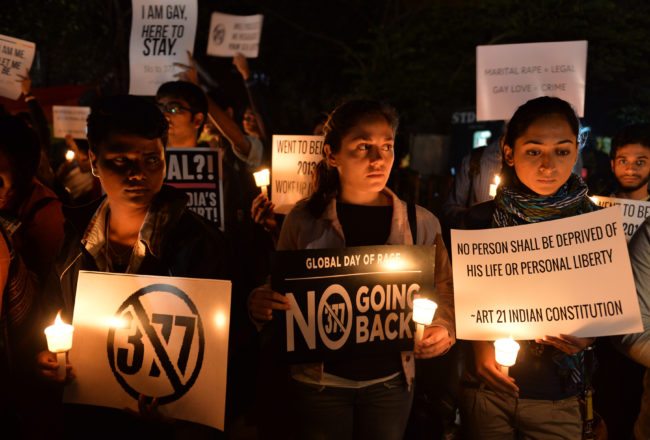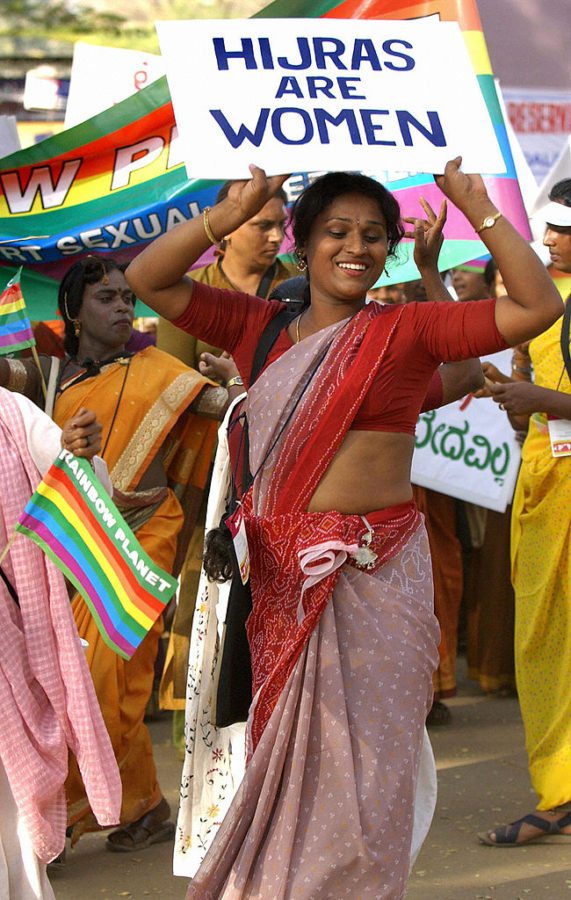India’s most famous gay radio host wants you to know: love is love

Homosexuality is still criminalised in India, punishable by up to 10 years of imprisonment. But that didn’t stop radio station Ishq 104.8 FM from launching its first LGBT radio show.
It’s been two months since its launch, and despite India’s wider political hostilities towards LGBT people, Gaydio has found wide-ranging support.
Its host is one of India’s most well-known gay activists, Harish Iyer.

(Getty)
Only a few public figures are openly gay in India, and Iyer has been one of the most vocal about LGBT rights, ever since his mother posted an ad in a national newspaper looking for a match for her son.
Matchmaking ads are common in India, but his was the first ever gay ad.
Fast forward a decade or so, and he’s now listed by the Guardian as one of the ‘100 most influential LGBT people in the world’. Oh, and President Barack Obama follows him on Twitter.
Far from being a regional icon, he’s been interviewed by the likes of gay icons like Ellen Page and Stephen Fry.
PinkNews spoke to Harish to ask him how Gaydio is changing India’s national conversation about LGBT rights.
When asked why now was the time for to start an LGBT show, Iyer quoted Victor Hugo, saying: “There is no stopping an idea whose time has come.
“It was the radio station that thought of having a dedicated LGBTIQ show, which I believe is revolutionary. It is a station called ‘ISHQ’.
“ISHQ is an Arabic word which means love,” he explained.
So far, the show has hosted a diverse range of guests and fielded calls from people from all over the gender, caste, sexual and religious spectrum.
Just last month, Iyer hosted a woman from the ‘hijra’ community. Hijras are people who come under the banner of trans and intersex, and often occupy marginalised positions in society.
They’re legally recognised in India as belonging to a third gender, but are regularly discriminated against in the labour market and are often relegated to begging in streets for money.
Madhuri Sharma, a hijra woman, told the L.A. Times: “Transgender people don’t get love from anywhere”.
“We have gotten so much pain.”
Sharma explained that she was open to meeting people online because of the hostilities she encountered in real life.
“I had already been cast off from society,” she said.
“So if someone genuinely wants to meet me, why would I be scared?”

(Getty)
Iyer acts as a confidante for guests and listeners alike, who can call in to share testimonials like Sharma’s.
“They (the producers) wanted to extend love to all forms of love, not just the heterosexual, gender binary love.”
Since its launch, Iyer said that “the response has been largely positive, it has become a conversation starter.
“For people who were long brushing the issue under the carpet, they just need to keep the radio on while their family listens to the show in full blaze and get educated.”
“In fact, I have received a couple of mails telling me that [I] pushed their “coming out” envelope a little further using the show.”
There are costs however, to such an open and vocal refusal to accept homophobia, Iyer explained.
“We have recorded our shows in Mumbai, which is largely a gay-friendly city.
“However, I have definitely managed to irk some religious fundamentalists who sent me some lovely ‘God will curse you, you will go to hell’ mail.
“I even naughtily indulged one of them with a response like ‘Are all the ‘bad’ boys in hell? I would love to be with them’.”
The abuse, though obviously unacceptable, is a disruption to normalised attitudes of hate – a welcome result of a project which aims to broaden popular representations of love.
“Well, some of these funny homophobic mails are a validation of our success,” he said. “I love them.”
When asked what his predictions were for the future of India’s LGBT community, he said he had reason to be hopeful, even though “India still holds Victorian morality as its own – supposedly, we love the Queen more than you do.”
A part of Indian law called Section 377 criminalises all sexual activity that is not for reproduction.
This put the future of anti-gay law Section 377 in doubt, but it still remains for now.
Iyer said he was glad that his programme was at least making a difference.
“I never thought that the reach would be so large and far-reaching.
“I have been getting just as many emails and calls I got after doing regular television interviews, which is quite an eye-opener for me.”
Even Bollywood has his back, he said.
“The support from Bollywood has been overwhelming. Many stars have lent their voice of support to the cause and have wished me well.
“We are yet to encounter anyone who has outright refused to [contribute].”

